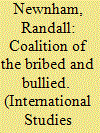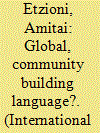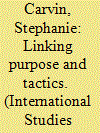| Srl | Item |
| 1 |
ID:
081994


|
|
|
|
|
| Publication |
2008.
|
| Summary/Abstract |
When the United States invaded Iraq in 2003, critics referred to its allies not as the "Coalition of the Willing," but as the "Coalition of the Bribed, Bullied, and Blind." How accurate is this view? This paper will examine the role of American economic linkage as a policy tool in shaping the coalition. As we shall see, sometimes positive economic instruments were used, ranging from foreign and military aid to access to U.S. markets. For other countries negative linkage was used, that is, the threat of economic sanctions. In the end, such tactics were often effective. This helps demonstrate the relevance of economic linkage in forming alliances
|
|
|
|
|
|
|
|
|
|
|
|
|
|
|
|
| 2 |
ID:
081990


|
|
|
|
|
| Publication |
2008.
|
| Summary/Abstract |
Although long championed, a global language has not come to fruition despite considerable efforts. Many fear that such a language would undermine the particularistic, identity-constituting primary languages of local and national communities. These concerns can be addressed at least in part by utilizing a two-tiered approach in which efforts to protect primary languages are intensified at the same time that a global language is adopted as an additional language and not as a substitutive one. Although the U.N. or some other such global organization could, theoretically, choose a language to serve as the global language, English is already (and increasingly) occupying this position as a result of the colonial period and post-colonial developments. In this respect, English is compared to the development of the railroad system in the United States, which although introduced at considerable human costs by overpowering corporations, later became an integral part of the economy and society. Whether English should be adopted as a second language, or as a third or fourth one, is heavily influenced by the level of difficulty involved-the labor to fluency ratio-in acquiring a new language
|
|
|
|
|
|
|
|
|
|
|
|
|
|
|
|
| 3 |
ID:
081993


|
|
|
|
|
| Publication |
2008.
|
| Summary/Abstract |
Suspected war criminals who remain at large can do great damage to post-conflict, peace-building efforts. I develop a model of war criminal apprehension predicated on the behavior of international actors to alter the cost/benefit calculus of suspected war criminals and their supporters and make them either more susceptible to capture or make them more likely to surrender. I test this model with duration analysis using data from the International Criminal Tribunal for the Former Yugoslavia regarding the indictment and capture/surrender (if achieved) of over 100 individuals wanted for war crimes, crimes against humanity and genocide. The results demonstrate that not only is it possible to model these phenomena, but that there are a variety of actions the international community can take to facilitate the capture and surrender of suspected war criminals.
|
|
|
|
|
|
|
|
|
|
|
|
|
|
|
|
| 4 |
ID:
081991


|
|
|
|
|
| Publication |
2008.
|
| Summary/Abstract |
The critique of the laws of war (and international law in general) coming out of America as the war on terror began seemed to have emerged as a response to the horror of 9/11 and the belief that the United States was now engaged in a "new paradigm" of warfare. However, the Bush administration's argument needs to be situated in a wider historical context. The source of the arguments against applying the Geneva Conventions to the prisoners caught in Afghanistan emerged well before 9/11 and can be traced to the end of the Cold War. These doctrines emerged out of the work of the "new sovereigntists" and out of the frustrations guided by coalition warfare. This paper seeks to trace the origin of these arguments which challenge the traditional division between jus ad bellum (the law governing the resort to force) and jus in bello (the law governing tactics in warfare).
|
|
|
|
|
|
|
|
|
|
|
|
|
|
|
|
| 5 |
ID:
081992


|
|
|
|
|
| Publication |
2008.
|
| Summary/Abstract |
The level of non-combatant casualties in modern Western warfare is determined in large part by the way in which policymakers apportion risk between soldiers and civilians. In the U.S. counterinsurgency in Iraq, a "kinetic" strategy and a muscular doctrine of force protection have lowered the threshold for the use of violence and, in many cases, transferred risk from soldiers to civilians. Particularly in areas deemed hostile, aggressive tactics make up for a shortage of soldiers on the ground and direct violence toward non-combatants. This is not the fog of war: even unintended civilian casualties flow predictably from policy choices. Perceptions of risk increasingly govern U.S. interpretations of its humanitarian obligations under international law, threatening to dilute the doctrine of proportionality and reverse the customary and legal relationship between combatants and non-combatants. Only late in the war has the U.S. administration recalibrated risks and launched a more orthodox counterinsurgency strategy
|
|
|
|
|
|
|
|
|
|
|
|
|
|
|
|
| 6 |
ID:
081995


|
|
|